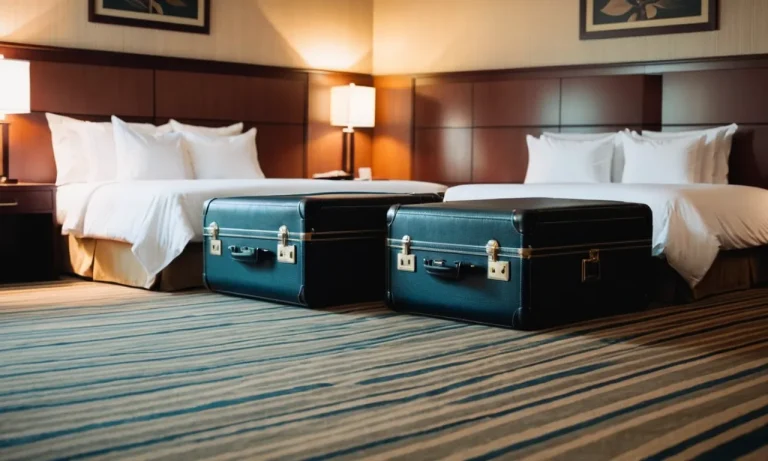How Do Homeless Get Hotel Vouchers? A Comprehensive Guide
Homelessness is a harsh reality that many individuals face, and finding temporary shelter can be a daunting task. One solution that has gained traction is the provision of hotel vouchers, which offer a safe and comfortable place to stay for those in need.
If you’re short on time, here’s a quick answer to your question: Homeless individuals can obtain hotel vouchers through various organizations, including government agencies, non-profit organizations, and faith-based groups.
The process typically involves meeting specific eligibility criteria and following the organization’s application procedures.
In this comprehensive article, we will delve into the intricacies of how homeless individuals can secure hotel vouchers. We will explore the different organizations that offer these vouchers, the eligibility requirements, the application process, and the potential challenges that may arise.
Additionally, we will provide insights into the benefits of hotel vouchers for the homeless community and discuss alternative solutions for those who may not qualify.
Understanding Hotel Vouchers for the Homeless
What are Hotel Vouchers?
Hotel vouchers, also known as motel vouchers or shelter vouchers, are a form of temporary housing assistance provided to individuals and families experiencing homelessness. These vouchers allow them to stay in a hotel or motel for a specified period, typically ranging from a few nights to a couple of weeks.
The vouchers are often issued by local governments, non-profit organizations, or social service agencies, with the aim of providing a safe and secure place to stay while individuals work towards finding more permanent housing solutions.
Benefits of Hotel Vouchers for the Homeless
- Immediate Shelter: Hotel vouchers offer an immediate solution for those who find themselves without a roof over their heads, providing a safe and private space to stay.
- Dignity and Privacy: Unlike traditional shelters, hotel rooms offer a sense of dignity and privacy, which can be crucial for maintaining mental health and well-being.
- Access to Amenities: Many hotels provide basic amenities such as a bed, bathroom, and sometimes even a kitchenette, making it easier for individuals to maintain a sense of normalcy.
- Temporary Respite: Hotel vouchers can serve as a temporary respite, giving individuals the opportunity to regroup and focus on finding more permanent housing solutions.
Challenges in Obtaining Hotel Vouchers
While hotel vouchers can be a lifeline for many experiencing homelessness, obtaining them can be a challenging process. According to a report by the National Alliance to End Homelessness, https://endhomelessness.org/, only about 20% of homeless individuals in the United States have access to emergency shelter or hotel vouchers. This is often due to limited funding and resources available to local organizations and agencies.
Furthermore, eligibility criteria for hotel vouchers can vary widely between different programs and locations. Some may prioritize families with children or individuals with disabilities, while others may have strict income or background requirements.
The process of applying for and receiving a voucher can be bureaucratic and time-consuming, adding to the stress and uncertainty faced by those experiencing homelessness.
Despite these challenges, many organizations and advocates continue to push for increased access to hotel vouchers as a temporary solution. They argue that providing a safe and dignified place to stay can be a stepping stone towards more permanent housing solutions and can help individuals maintain a sense of hope and stability during difficult times.
😊
As the issue of homelessness persists, it is crucial that communities work together to address the challenges and barriers surrounding hotel voucher programs, ensuring that those in need have access to this vital resource. By doing so, we can help individuals and families regain their footing and move towards a brighter future.
🎉
Organizations Providing Hotel Vouchers
When it comes to finding temporary shelter for those experiencing homelessness, hotel vouchers can provide a crucial lifeline. These vouchers offer a safe and comfortable place to stay, often serving as a stepping stone towards more permanent housing solutions.
Fortunately, there are various organizations dedicated to assisting individuals and families in need by providing hotel vouchers.
Government Agencies
Local and state government agencies play a vital role in addressing homelessness. Many cities and counties have dedicated programs that offer hotel vouchers to those in need. For example, the Denver Human Services provides emergency hotel vouchers for families and individuals facing homelessness.
According to their statistics, they have assisted over 1,500 households with hotel vouchers in the past year alone.
Non-Profit Organizations
Numerous non-profit organizations across the country have made it their mission to support those experiencing homelessness. Organizations like Family Promise and Covenant House offer hotel voucher programs, often in partnership with local hotels and donors.
These organizations not only provide temporary shelter but also offer comprehensive support services, such as case management, job assistance, and counseling, to help individuals and families transition into stable housing.
Faith-Based Groups
Many faith-based organizations and churches have established programs to assist the homeless in their communities. For example, Catholic Charities of Santa Marta operates a hotel voucher program that provides emergency shelter and support services to families and individuals facing homelessness.
These organizations often rely on donations and volunteer efforts to fund and administer their programs.
Local Initiatives
In addition to larger organizations, there are often grassroots initiatives and community-based efforts aimed at addressing homelessness at a local level. These initiatives may involve partnerships between local businesses, community centers, and volunteers to raise funds and provide hotel vouchers to those in need.
For instance, the Austin Hotel Works program in Texas collaborates with local hotels to offer discounted rates for hotel vouchers, making temporary shelter more accessible to those experiencing homelessness.
It’s worth noting that eligibility criteria and application processes may vary among these organizations. Some may require proof of income, residency, or specific circumstances to qualify for hotel vouchers.
It’s always recommended to research and contact these organizations directly for the most up-to-date information and guidance on their programs and services. By leveraging the resources provided by these organizations, individuals and families facing homelessness can find a temporary respite and a stepping stone towards a more stable future.
Eligibility Criteria for Hotel Vouchers
Obtaining a hotel voucher as a homeless individual can be a lifeline, providing temporary shelter and a safe space to regroup. However, the eligibility criteria vary depending on the organization or agency offering the vouchers, and it’s crucial to understand the requirements to increase your chances of securing one.
Here’s a comprehensive guide to the eligibility criteria for hotel vouchers:
Income and Financial Requirements
Most organizations that provide hotel vouchers have income limits or financial requirements in place. These limits are typically based on the federal poverty guidelines or a percentage of the area median income (AMI). For example, according to the U.S.
Department of Housing and Urban Development (HUD), a household of four in New York City with an annual income below $83,000 (50% of AMI) may qualify for certain housing assistance programs, including hotel vouchers.
It’s essential to have documentation of your income, such as pay stubs or benefit statements, to verify your eligibility.
Homelessness Verification
Organizations providing hotel vouchers typically require proof of homelessness. This can include a letter from a shelter, a statement from an outreach worker or case manager, or documentation showing you are currently residing in a place not meant for human habitation.
Some agencies may also accept a self-declaration of homelessness, but this varies based on their policies. According to a study by the National Alliance to End Homelessness, on a single night in 2022, approximately 582,462 people experienced homelessness in the United States, highlighting the pressing need for assistance like hotel vouchers.
Special Circumstances (e.g., Families, Veterans, Victims of Domestic Violence)
Many organizations prioritize certain populations when distributing hotel vouchers. Families with children, veterans, and victims of domestic violence often receive preferential treatment due to their vulnerable situations.
For example, the HUD-VASH program specifically targets homeless veterans and provides housing assistance, including hotel vouchers, to help them transition into permanent housing. Similarly, organizations like the National Domestic Violence Hotline can connect victims of domestic violence with local resources, including emergency shelter options like hotel vouchers.
It’s important to note that eligibility criteria can vary significantly depending on the organization, location, and available funding. Some organizations may have additional requirements or prioritize certain populations based on their specific mission or resources.
Don’t hesitate to reach out to local shelters, social service agencies, or call the national hotline (1-800-799-SAFE) for more information on obtaining hotel vouchers in your area. Remember, these vouchers are designed to provide temporary relief and support while you work towards securing permanent housing solutions.
The Application Process for Hotel Vouchers
Obtaining a hotel voucher as a homeless individual can be a lifeline, providing temporary shelter and respite from the harsh realities of life on the streets. However, the application process can be daunting, with various requirements and procedures to navigate.
In this section, we’ll delve into the nitty-gritty of securing hotel vouchers, shedding light on the necessary documentation, interviews, assessments, and the often-challenging waiting lists and prioritization criteria.
Required Documentation
The first step in the application process typically involves gathering the necessary documentation. This may include:
- Government-issued identification (ID, birth certificate, etc.)
- Proof of homelessness (letter from a shelter, outreach worker, or service provider)
- Income verification documents (if applicable)
- Medical records or disability documentation (if relevant)
It’s crucial to have these documents readily available, as they serve as proof of eligibility and help establish priority for receiving assistance.
Interviews and Assessments
Once the required documentation is in order, applicants may need to undergo interviews and assessments conducted by case managers or social workers. These interviews aim to understand the individual’s unique circumstances, identify any specific needs or vulnerabilities, and determine the most appropriate course of action.
According to a report by the National Alliance to End Homelessness (https://endhomelessness.org/), comprehensive assessments play a crucial role in ensuring that limited resources are allocated effectively and tailored to the specific needs of each individual.
During these interviews, applicants may be asked about their current living situation, support systems, employment status, and any physical or mental health concerns. It’s important to be candid and provide accurate information, as this will help case managers make informed decisions and connect individuals with the appropriate resources and services.
Waiting Lists and Prioritization
Unfortunately, due to the high demand for hotel vouchers and limited resources, many applicants find themselves placed on waiting lists. Prioritization criteria are often used to determine the order in which individuals receive assistance. These criteria may include factors such as:
- Vulnerability (age, disability, domestic violence, etc.)
- Chronic homelessness status
- Families with children
- Veterans
According to a study by the U.S. Department of Housing and Urban Development (HUD), https://www.huduser.gov/, in 2020, nearly 580,000 individuals experienced homelessness on a given night 😔. With such staggering numbers, the demand for temporary housing solutions often exceeds the available resources, leading to lengthy waiting periods for many applicants.
To increase your chances of receiving a hotel voucher promptly, it’s advisable to remain proactive, maintain communication with case managers, and explore alternative temporary housing options while navigating the application process.
Remember, perseverance and resilience are key when facing such challenging circumstances.
Alternative Solutions for Temporary Shelter
While hotel vouchers can provide temporary relief for those experiencing homelessness, there are several other alternative solutions available that offer more long-term support. These options not only provide a roof over one’s head but also aim to address the underlying causes of homelessness and help individuals get back on their feet.
Homeless Shelters
One of the most common alternatives to hotel vouchers are homeless shelters. According to the National Alliance to End Homelessness, there are over 10,000 homeless shelters across the United States, providing temporary housing and support services to those in need.
These shelters offer a safe and secure environment, often providing meals, counseling, and assistance in finding permanent housing and employment. However, it’s important to note that many shelters have limited capacity and may have strict rules and regulations, such as curfews and length-of-stay limits.
😐
Transitional Housing Programs
Transitional housing programs are designed to bridge the gap between homelessness and permanent housing. These programs typically provide housing for up to 24 months, along with supportive services such as job training, counseling, and life skills education.
According to the U.S. Department of Housing and Urban Development, transitional housing programs aim to help individuals and families achieve self-sufficiency and ultimately secure permanent housing. These programs can be particularly beneficial for those who have experienced long-term homelessness or have additional barriers to overcome, such as substance abuse or mental health issues.
👍
Rent Assistance Programs
Rent assistance programs are designed to help low-income individuals and families afford rental housing. These programs can take various forms, such as housing choice vouchers, also known as Section 8, or rental subsidies provided by local housing authorities or non-profit organizations.
By subsidizing a portion of the rent, these programs make housing more affordable and can prevent individuals from becoming homeless in the first place. 🎉
For example, the Housing Choice Voucher Program, administered by the U.S. Department of Housing and Urban Development (HUD), provides rental assistance to eligible low-income families and individuals.
Participants typically pay 30% of their adjusted monthly income towards rent, while the program covers the remaining portion. These programs can be a lifeline for those struggling to make ends meet and can help them maintain stable housing.
While hotel vouchers can provide temporary relief, these alternative solutions offer more comprehensive support and a pathway towards long-term housing stability. By exploring these options and seeking assistance from local organizations and housing authorities, individuals experiencing homelessness can find the resources they need to get back on their feet and secure a safe and stable living environment.
😊
Conclusion
Obtaining hotel vouchers for the homeless can be a lifeline, providing a safe and comfortable temporary shelter during challenging times. While the process may vary depending on the organization and location, it typically involves meeting specific eligibility criteria and navigating through an application process.
It is important to note that hotel vouchers are not a permanent solution to homelessness, but rather a temporary measure to provide respite and support. Ultimately, addressing the root causes of homelessness, such as poverty, lack of affordable housing, and mental health issues, requires a multifaceted approach involving government policies, community initiatives, and individual efforts.
For those who may not qualify for hotel vouchers or are seeking alternative solutions, options such as homeless shelters, transitional housing programs, and rent assistance programs can offer additional support.
By raising awareness and fostering a compassionate understanding of the challenges faced by the homeless community, we can work towards creating a more inclusive and supportive society.







